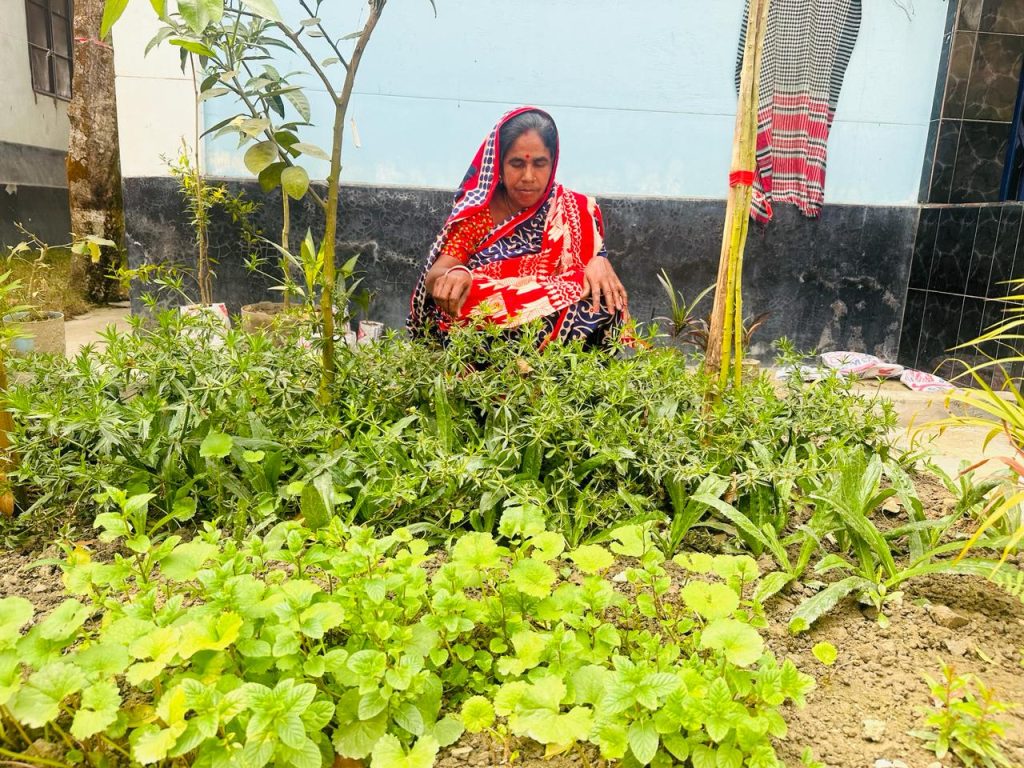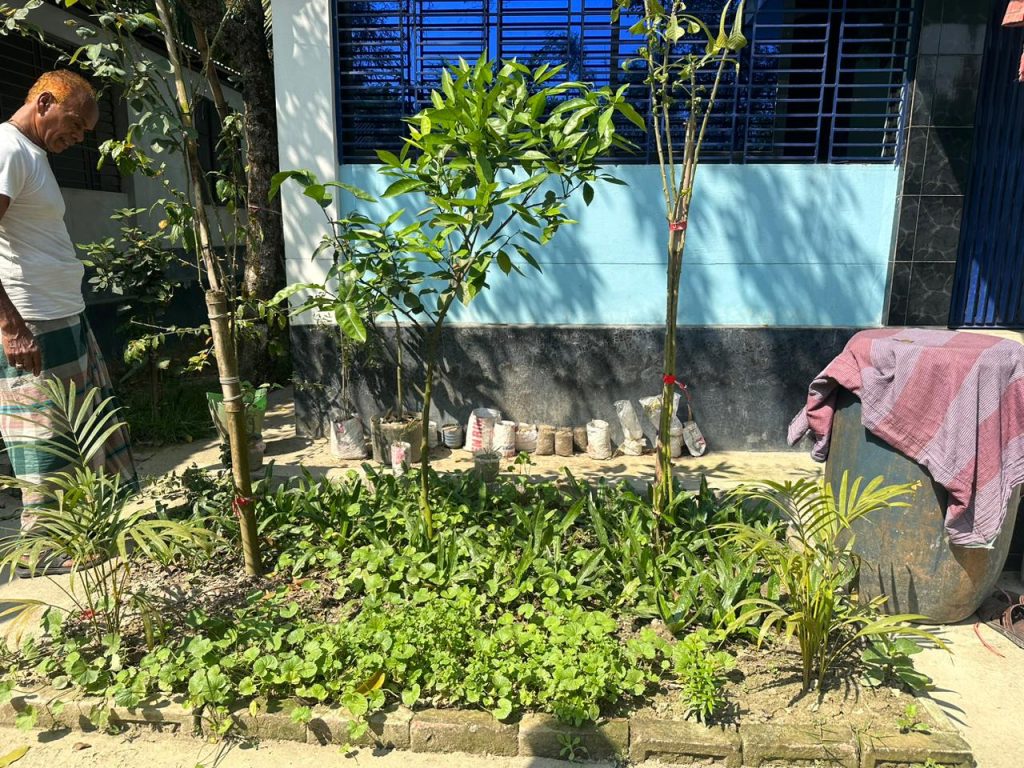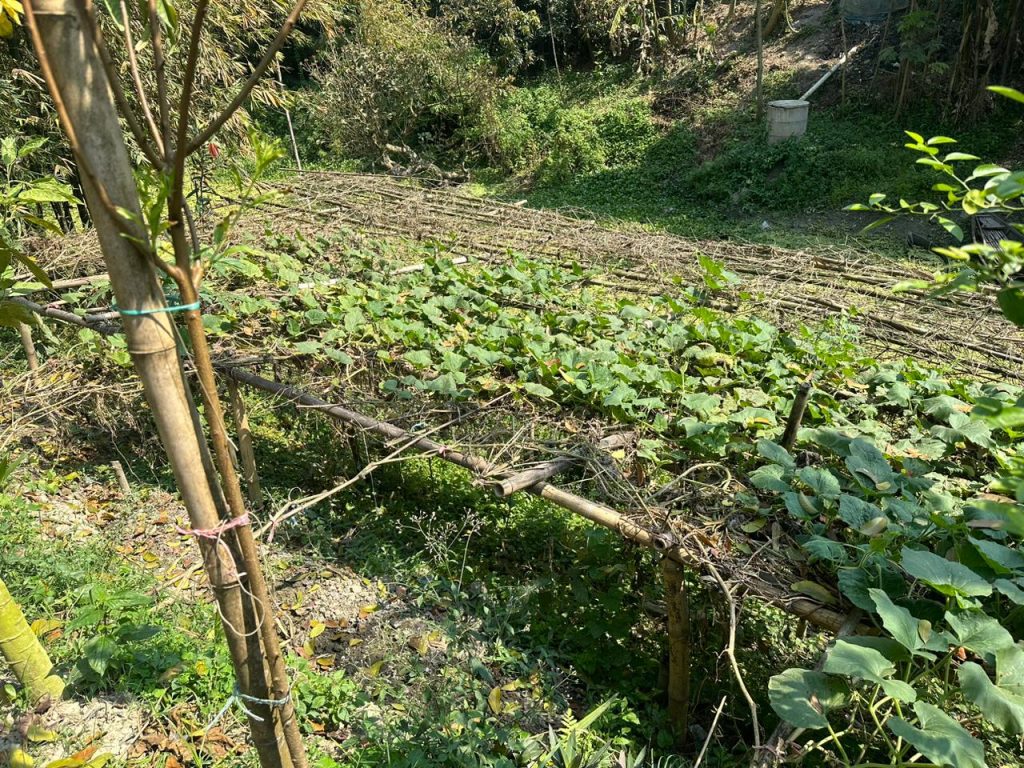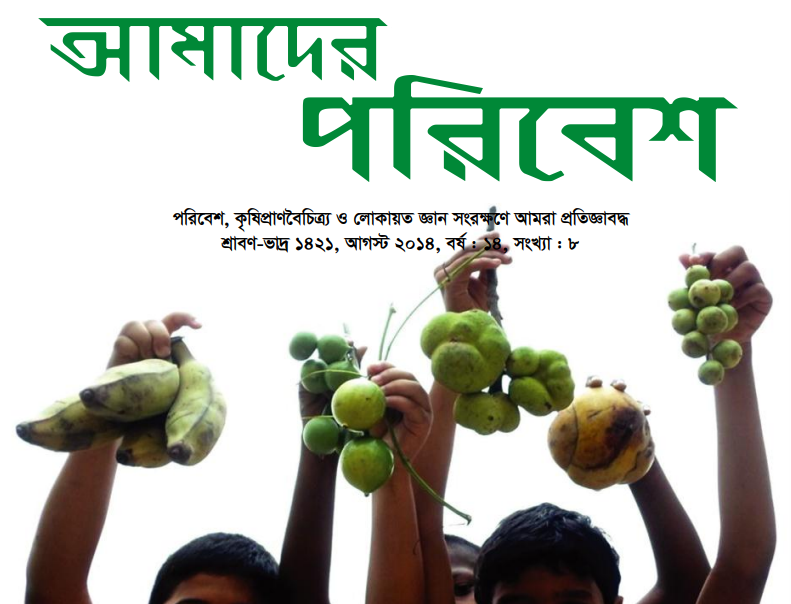By Shimul Biswas, Rasheda Akhtar, Beauty Sarkar, Rina Shikder and Ananya Akhtar from Manikganj.
The house of farmer Madan Kumar is filled with natural elements. The birds take shelter on the trees surrounding his house and they wake him up early in the morning! The 58 years old farmer of Atakaria village in Singair upazila of Manikganj district has developed a nature resource based aesthetic life and livelihood. He has developed his 35 decimal homestead depending on natural resources in such way that he gets everything from his house!
Flock of birds are seen in the morning. Sparrows interact with each other while the flock of Shalik and Satbhai châtare birds keep his house buzzing with conversation throughout the day. Butterflies are seen flying around and the hum of honey is also seen in the tree buds. Farmer Madan Kumar lives in a mutually interdependent relationship with nature through a unified natural environment.

However, Madan Kumar is a carpenter by profession. Along with this work he is also involved in agroculture producing a variety of vegetables, fruits and other crops in his homestead and cultivable lands throughout the year. This cultivation ensures him and his family member’s food security. Madan Kumar started to realize the importance of plants, animals, birds and insects in nature after reading a book called “Lakshapati” in his student life. Since then, he started collecting and conserving seeds, trees and plants of various species and varieties to contribute in building a healthy and beautiful life for himself and his family. In order to bring financial solvency he once went abroad and spent there for 3 years through his compassion for nature has not decreased. His wife Bhaila Rani and two kids Mrinal and Mrithil Mandal are also nature lovers due to Madan Kumar has instilled love and confidence in them to love the nature! Thus, while he is abroad his wife and children play an active role in maintaining and nourishing his nature based agricultural practices ensuring family nutrition. Besides, the 92-year-old Mantosh Mondal father of Madan Kumar is still encouraging this his son to protect the environment.
It is to be mentioned that BARCIK has been providing facilitation supports to Madan Kumar to keep continuing his nature based agricultural practices. BARCIK along with nature based farming encourages him to produce safe food leading him to use every spaces of his homestead to produce safe foods through his nature-based farming practices.
Recently, a group of observers working for a non-governmental organization visited his house and were impressed to see how he has managed his 35 decimal of land properly. The visiting team consist of 5 members through their observation mentioned that there 129 trees of 27 types in his land which include mango, coconut, peach fruit, grapefruit, pomegranate, palm, bilatigab, betel nut, jackfruit, litchi, papaya, guava, date, kadbel, latkon, lemon, atafal, nonafal, banana, Karamcha, local gab, Malta, Bel, Barai, Chalta, Hog, berry etc. There are some wooden trees such as Neem, Sheora, Hijal, Mahogany, Cedar, Shishu, Bot, Pakur, Basjhar, Jagdumur etc. in his homestead. He also conserved uncultivated plants such as neem, basak, tulsi, mint, shivajata, patharkuchi, lemon grass, joba, rakto chandan are kept at home for natural cure and pure environment. Being a nature lover Madan Kumar also grows paper flowers, sandhyamalti, bakul flowers, aparajita, madhabilata, tuntuni fruit, beli, jasmine, nayantara, shiuli, chrysanthemum, rangan, kathgolap, dattapriya, puttalika, dopati, kath beli, rose, nagchapa etc.

On the other hand, Madan Kumar has immense faith and trust in herbs to keep himself and his family members healthy. He collects and conserves medicinal plants such as Peepal, Janglakchu, Ghaopata, Canchla, Japanese creeper, Durba, Telakuch, Henchi, Kanailta, Dhengishak, White Kesarja, Black Kesarja, Bezinath, Bishallakarli, Thankuni, Bathua, Maniplant, Sonatulla etc. These plants meet their needs and Madan Kumar also shares these plants with his neighbors which plays important role to develop good relationship. Meanwhile, in order to meet the demand of safe food, he is cultivating 13 types of vegetable crops such as gourd, bean, sweet pumpkin, brinjal, bandweed, pepper, data, bitter gourd, potato, bilati swaz, dudhkachu, moringa, and different spinaches.
When ask why he prefers the nature based farming, Madan Kumar said, “I started to avoid market food which are adultery and not safe. I try to produce safe food through nature based farming. Today I do not buy food from the market except fishes, salt and meat. However, my house has very little space. I grow rice and mustard on 35 decimal land. I cannot cultivate spice crops due to lack of arable land.” He also mentioned, “I use the water of the canal you see next to my house to irrigate plants and agricultural crops.’ I have planted gourd trees inside the canal by collecting water hyacinth. I make compost from water hyacinth and use in my land. I also make pesticides using plant leaves. I have planted Marigold plants on the side of the land to control crop pests.’ He went on saying, ‘The two bamboo trees in the house help to prevent the erosion of my house on the one hand and on the other hand the vegetable loft, the fence of the cropland and the green crops meets my essential needs.”

The house of farmer Madan Kumar is rich in agroecological practices. Yet he thinks that there is opportunity to incorporate several farming practices into the house to make the agroecological practices more visible and vibrant. With the suggestions of BARCIK he plans to start the cultivation of onion, garlic, arhar, pulse, arum, sweet potatoes on the banks of the canal adjacent to the house. He will cultivate ginger and turmeric in the shaded area of his house. He also plans to rear livestock if gets supports. This will meet his meat and eggs demand. He also plans to rear duck in canals and cattle so that he could get materials for making manure with their dung. He is suggested to prepare and use pesticides made from tree fruits and leaves and create seed banks of local varieties to ensure availability of local adaptable seeds etc. According to the visiting team, if the above issues could be combined, farmer Madan Kumar’s house can transform to a research and practical learning center for natural resource and agroecology practice.
Translated by Silvanus Lamin

